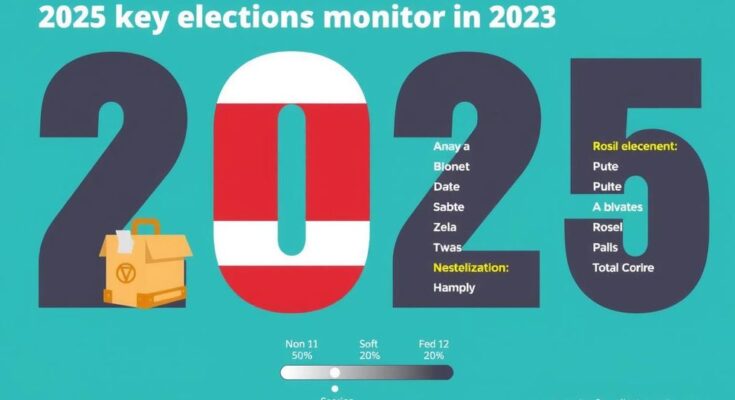In 2025, several key elections in Belarus, Germany, the Philippines, Canada, and Chile are set to take place, influenced by inflation, populism, and geopolitical factors. Each election carries significant implications for governance, power dynamics, and international relations, potentially affecting the political future of these nations amidst contemporary challenges.
As we approach 2025, several pivotal elections are scheduled across the globe, each influenced by pressing societal issues such as inflation, the rise of populism, and geopolitical tensions. Notably, elections in Belarus, Germany, the Philippines, Canada, and Chile will shape the political landscape in their respective nations. Analysts emphasize the significance of these elections, as they may solidify or alter existing power dynamics, offering insight into global trends in governance and citizen engagement.
In Belarus, the pivotal election on January 26, 2025, will see Alexander Lukashenko, the longest-serving authoritarian leader in Europe, vie for a seventh term. His government remains deeply entrenched, with limited genuine opposition present and continued repression of dissent. The absence of free elections could allow him to perpetuate Belarus’s alliance with Russia, further complicating regional security in light of ongoing conflicts.
The German federal election scheduled for February 23, 2025, emerges after a significant collapse of the current coalition government. Chancellor Olaf Scholz faces severe challenges, including economic recession and public dissatisfaction regarding the government’s budgetary policies. Navigating a divided electorate amid external pressures, including the ongoing war in Ukraine and potential trade conflicts with the United States, will be crucial for Scholz’s survival as Chancellor.
In the Philippines, senatorial elections on May 12, 2025, will act as a proxy referendum on President Ferdinand Marcos Jr.’s administration. The political landscape remains deeply affected by historical narratives surrounding the Marcos dynasty and the legacy of the Duterte regime. Should Marcos secure a favorable Senate, it could enable him to consolidate power further, while also impacting vice presidential dynamics.
Canada anticipates a potential federal election ahead of the scheduled date of October 20, 2025. Prime Minister Justin Trudeau finds his government precariously positioned amidst internal party strife and declining approval ratings. This electoral round may redefine Canada’s political identity sharply between a progressive and a conservative populist future, particularly as external pressures from the U.S. intensify.
Finally, the Chilean presidential election, set for November 16, 2025, will confront the need for a stable governance model following constitutional challenges. In a divided political arena, voters’ preferences will likely reflect a desire for a clear response to socioeconomic issues and governance effectiveness. The election will be crucial not only for Chile’s immediate political future but also as a broader indicator of Latin American trends in democratic engagement and governance.
The article discusses upcoming significant elections in five countries: Belarus, Germany, the Philippines, Canada, and Chile. Each of these elections is influenced by various contemporary issues such as political opposition, economic conditions, and historical political dynamics. The authors, experts in international relations and political science, provide insights into potential outcomes and implications, highlighting how these elections reflect broader global trends.
The elections in 2025 represent crucial junctures for each of the discussed nations, potentially reshaping their political identities and international relations. With the rise of populism and pressing socio-economic issues at play, these elections will not only affect local governance but may also reverberate through global political landscapes. Observers will be keenly watching how these elections unfold, as their outcomes could signal significant shifts in governance and public sentiment worldwide.
Original Source: cobbcountycourier.com




